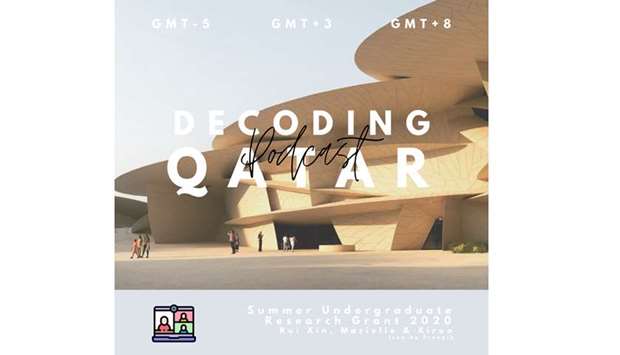A new research project produced by Northwestern University in Qatar students hopes to change the narrative on what it means to live, work, study, and raise a family in Qatar.
Decoding Qatar, a podcast series on Instagram highlights the country’s history, culture, language, tourist attractions, entertainment, and employment and investment opportunities through the voices of residents in Qatar.
“Qatar is a small country with a big ambition,” said João Queiroga, assistant professor and advisor on the project. “Over the past two decades, it transformed from a quiet, relatively unknown country, to one in a position of power in international sports, education, and politics. Despite it being a cosmopolitan and modern place to live, many people remain unaware of what it is actually like to live here – our goal is to give its residents control of the narrative about life in Doha.”
Earlier this year, students Marielle Aguelo Cortel, Xiruo Chen, and Rui Oh, supported by Queiroga, received a grant from Northwestern University’s Office of Undergraduate Research to develop a multimedia project on life in Qatar, focusing on residents and nationals’ perceptions of the country’s new-found wealth and rapid urban and social development.
While the group’s initial plan was to create a documentary, restrictions imposed by the COVID-19 pandemic meant they had to revisit their original strategy and find alternative mediums to bring their stories to life. While working remotely from China, Singapore, and Qatar, they decided the best platform would be a podcast format coupled with animated visual elements.
While the turn of events was unexpected, Oh explained that it enabled them to expand their research by including more people. Through a podcast format, she said, “we have been able to take our project a step further and reach out to and interview more residents and nationals than initially planned to better reflect Qatar’s melting pot of cultures.”
For the students, the project serves as an outlet to correct fallacies and stereotypes of the Qatari community and life as an expatriate in the country. “As our undergraduate years in Qatar have been illuminating and pleasant, we consider Qatar as a second home and find it pivotal to dispel foreigners’ common and often, only conception of Qataris as wealthy individuals who lead luxurious lifestyles,” explained Cortel.
The project launched with a podcast featuring a general manager from Singapore who has lived in Qatar for more than 10 years and considers it his home. He discusses professional relationships he has with Qatari businessmen and the comfortable life he has been able to provide his family by working in Doha.
Their second guest is a journalist from Greece who moved to Qatar in 2017 and explains how she feels safer living and working in Doha than she did in Athens, especially as a woman.
Future podcasts will feature a Filipino couple who will discuss the opportunities that have been provided to their family while living in Qatar and a Northwestern Qatar alum who will offer a local perspective as a Qatari national, explaining her country’s hospitable culture and close-knit family relations.
Along with the podcasts, the students are using their Instagram account to promote facts about Qatar through the use of interactive quizzes, covering topics that include the country’s international investment portfolio, meanings behind major art pieces and installations in Qatar, and unique details about the country’s desert landscape and climate.
“This project celebrates Qatar and its multicultural workforce and inherent diversity. I’m very proud of Xirou, Rui, and Marielle for producing such excellent work despite the limitations of the pandemic,” said Queiroga.

